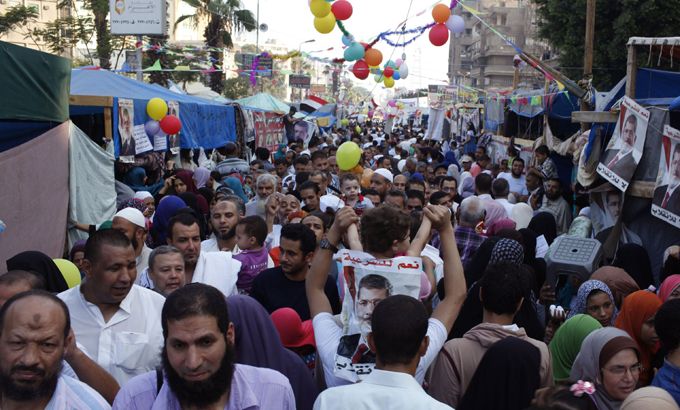Egypt sides told to end ‘dangerous stalemate’
US and EU warn political deadlock “holds risk of more bloodshed” as interim government says diplomacy phase has ended.

The US and the European Union have called on all sides in Egypt’s political crisis to end “a dangerous stalemate” after the interim government said foreign mediation efforts had failed.
The joint statement came as the army-installed government repeated its threat to take action against supporters of deposed President Mohamed Morsi.
On Thursday, large numbers of Morsi supporters celebrated Eid at a site which has been used regularly for protests in Nasr City.
“This protest has perservered during Ramadan …They [protesters] are here in huge numbers now, saying to the government that Morsi is the legitimate president, and they won’t leave until he is reinstanted,” said Al Jazeera’s Rory Challands, reporting from Nasr City.
This remains a very fragile situation, which holds not only the risk of more bloodshed and polarisation in Egypt, but also impedes the economic recovery
Both sides called their supporters to rally on Thursday.
Interim President Adly Mansour, in a message on the eve of the Muslim Eid al-Fitr holiday, said Egypt was in critical circumstances. The interim government would press on with its own plan to hold new elections in nine months, he said.
“The train of the future has departed, and everyone must realise the moment and catch up with it, and whoever fails to realise this moment must take responsibility for their decision,” he said.
US envoy William Burns headed home after days of trying to broker a compromise between the government and Morsi’s Muslim Brotherhood. European Union envoy Bernardino Leon stayed on in the capital in the hope of reviving the effort.
But Brussels and Washington said they were very concerned that the Egyptian parties had not found a way to break what they called “a dangerous stalemate”.
“This remains a very fragile situation, which holds not only the risk of more bloodshed and polarisation in Egypt, but also impedes the economic recovery, which is so essential for Egypt’s successful transition,” US Secretary of State John Kerry and EU foreign policy chief Catherine Ashton said in a joint statement.
‘Preparing for bigger massacre’
The army ousted Morsi, Egypt’s first freely elected leader, on July 3 after huge street demonstrations against his rule.
Morsi and leaders of his Muslim Brotherhood have been rounded up and detained. But thousands of their supporters have demonstrated to demand his reinstatement.
Nearly 300 people have been killed in political violence since the overthrow, including 80 Morsi supporters shot dead by security forces on July 27.
Mansour earlier on Wednesday blamed the Muslim Brotherhood for the breakdown of the international mediation effort, and for any violence that might result.
Interim Prime Minister Hazem el-Beblawi said the government’s decision to dismantle the protest camps was final and its patience had nearly expired.
Beblawi accused protesters of inciting violence, blocking roads and detaining citizens, and he warned that any further violence would be met “with utmost force and decisiveness”.
People should leave the camps now, Beblawi said.
Muslim Brotherhood spokesman Gehad el-Haddad, asked about the threat, told the Reuters news agency: “This means they are preparing for an even bigger massacre. They should be sending us positive signals, not live bullets.”